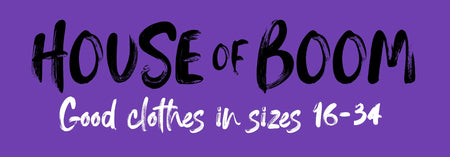
On the sustainableness of Boom
Here's some of the green products that I sell so that I can totally greenwash my environmental image!
But, seriously, let's have a chat about sustainability. It's often said with clothes, you can choose two of affordable, sustainable and ethical - and with clothes for fat people, you're lucky if you even get to pick one. When I started House of Boom, I made a very clear choice - I wanted to be ethical.
But I have to qualify that - my ethics centre on what I have control over, here in NZ. My fabrics come from overseas. Most of my fabrics are imported by Frost Textiles, and they come from China, which is generally better to its textile workers than Pakistan or Bangladesh, but I do not know what the factories are like. I can tell you though that the seamstresses - based in Naenae, Waikane and other places in Welly who are contracted by Iona at Umsiko, my production manager, are paid more than the living wage and some come from refugee backgrounds. Other stock comes from other small NZ businesses so the money you spend on Boom goes back into the local economy. My priority is treating my customers well and being a source of strength and joy in the fat community.
But this post was going to be about sustainability, so here goes. Most Boom clothing is cotton, which means it's eventually biodegradable and isn't releasing microplastics into the waterways every time you wash it. But the trade-off is that cotton is a thirsty bitch. And because to me keeping my clothes (relatively) affordable is a key part in treating my community ethically, it's generally not organic cotton, so there's pesticides and all that fun stuff involved too.
For me, the best way I can be sustainable is to create comfortable classic clothes that you will want to wear often, and that are well-made so they won't need to be replaced in a hurry. That's the best impact I can make. Sure, there's additional stuff - like offcuts going to Gerty Brown and Juli Hunter to be repurposed and cut down waste. Your orders come in compostable bags, and are wrapped in recyclable tissue. But those are just drops in the bucket.
What I really hope is that by contributing positively to the fat community, we can all be empowered to demand better from those who can really make an impact. And we can have pockets while we do it.
